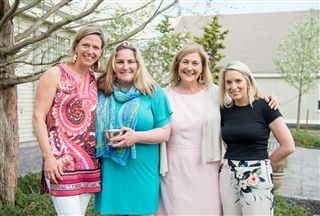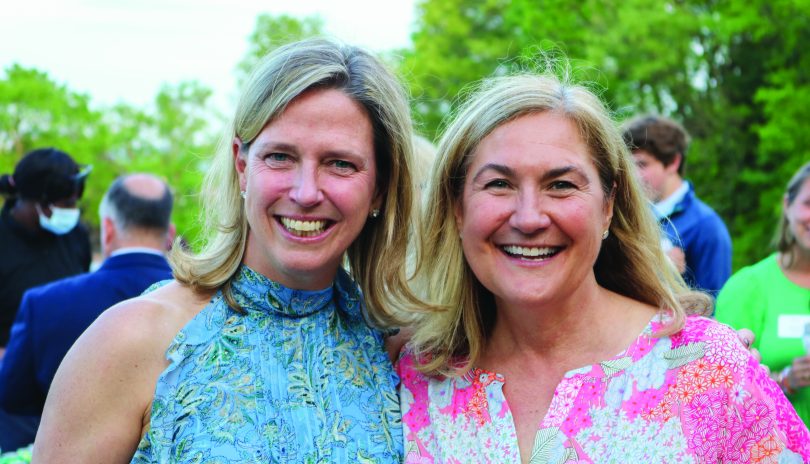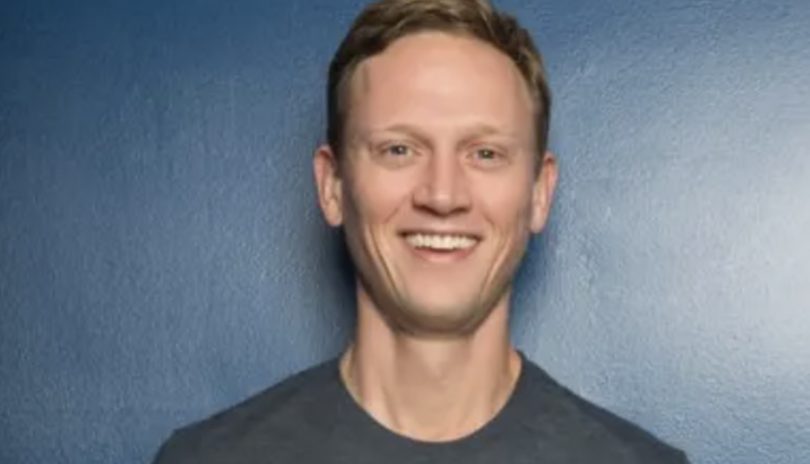Elizabeth Woelfel Harvey ’92 shares her story of courage and tenacity in the face of a devasting diagnosis for her 17-month old son. Elizabeth took the initiative and developed a family assistance program to help other families facing the financial burden of treating Duchenne Muscular Dystrophy.
When Elizabeth Woelfel Harvey ’92 looks back on her years at DCD, she remembers playing field hockey under Coach Deb White as one of the highlights of her time as a student here. Her love of sports led her to continue playing at Nobles, where she was a three-sport varsity athlete all four years, and to go on to play at Holy Cross, where she was lacrosse captain for two years.
She remembers her life growing up as ideal, a happy family life, going to great schools, surrounded by good friends, one that she’d hoped to duplicate for her own children, Caroline, 13, and JB, 10. That vision would soon be challenged.
In 2009, Beth received the devastating news that her 17-month-old son JB had Duchenne Muscular Dystrophy (DMD), a progressive muscle disease that afflicts one in 3,500 boys and is the leading genetic cause of death among children. The prognosis wasn’t good. There was no cure, very little research, and almost no support for the families and children suffering with the effects of the disease.
While stunned and initially depressed by the diagnosis, she quickly went about encouraging family members and friends to contribute to the few organizations funding research in to a cure. Eventually taking matters in to her own hands, and to ensure funds went to research not overhead, she founded her own organization, JB’s Keys.
“I started off encouraging family members to fundraise for another organization, but I just felt that I wanted to be completely true with our donors and I wanted to be able to tell my family and friends that every dollar they were giving us was making a difference.”
JB’s Keys identified three areas of need: awareness, support for quality care and treatment, and research, and began raising funds as an all-volunteer, not-for-profit foundation.
Until about a year ago, when she “reluctantly” began to take a salary, she relied solely on “good friends, who are passionate about helping JB and others like him,” to help her raise funds. So far, JB’s Keys has raised a nearly $2.5 million.
Recently, her foundation has shifted its focus somewhat from research to providing a better quality of life for young men living with Duchenne’s.
“When we first started, she says, “JB was so little I had no idea about what this disease meant, but now that he’s older, I see the toll it’s been taking on him.”
Reflecting on the changes over the years since JB was diagnosed, she says, “there was one company working on Duchenne’s research and no FDA-approved drugs. Now there are almost 20 companies involved in research with Biotech starting to invest more in research into rare diseases.”
“We don’t have millions of dollars to make a dent in making the next big cure happen. We’re filling a gap to make sure these kids are healthy and happy enough to benefit from the research that’s going on.”
To fill that gap, the organization is supporting a number of different initiatives, including an adaptive sports scholarship that provides weekends away at Loon Mountain.
“We try to make it a whole family affair, two nights in a hotel where family members can ski or sail or rest,” she says. “This winter we had 20 young men enjoy two full days of skiing on Saturday and Sunday.” The organization also supports a sailing weekend on the Cape.
Partnering with another organization, they are starting a family assistance fund to help families with the financial burden of Duchenne’s to cover expenses outside of what insurance covers, for example, a ramp for the house or an accessible van.
“We’ve been flying to a clinic in Cincinnati the past few years, which is not covered,” she explains. Citing the rigors of putting kids through clinical trials, she says, “It’s nice to give them a treat at the end of the day to say thanks for what you’re doing.”
After many years of flying to Cincinnati, Beth is excited to be supporting the opening of a new Duchenne’s clinic at UMass Medical, headed by a doctor recruited from Cincinnati.
Hopefully, that will make it easier on JB, who goes every month for a full-day infusion, has regular physical therapy, and a one-on-one aide to support him in school, in addition to undergoing clinical trials when he can. As he’s gotten older, she says, “We’ve had to become a little more realistic, recognizing it’s hard to have Duchenne’s.”
Other than that, he’s just like any other kid, she says, and like his mother, he loves sports. “He loves watching or participating in any type of adaptive sports.” JB has been a member of the Boston College football team through Team Impact, an organization that matches kids with illnesses with players from college teams, some of whom have visited his elementary school in Dover. “He likes to ski because he likes to go fast! He’s got a great sense of humor and a ton of friends.”
Her own happy childhood and upbringing have been the motivating factors in helping JB enjoy a normal childhood. “I really did have a great upbringing with my family and a great education at DCD and then at Nobles, with good friends, and I just felt that I wanted that so much for my kids, and just because he has this disease, I wanted to fix as much as I could to make it as good a childhood as I had.”
While her competitive nature and tenacity honed through participating in sports over the years has helped her in the fight against Duchenne’s, she says, “You have to admit that you can’t fix everything and you can’t always win.” Still, she’s trying as hard as she can to make a difference, not only in her son’s life, but in the lives of all the other boys and young men afflicted with Duchenne’s.







